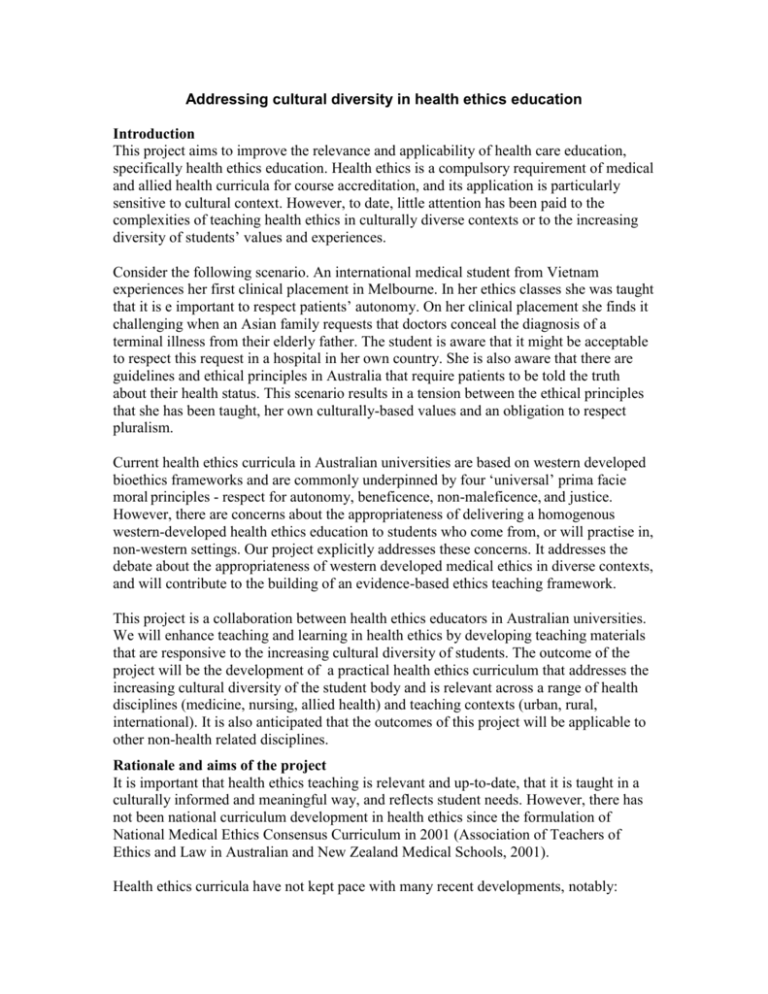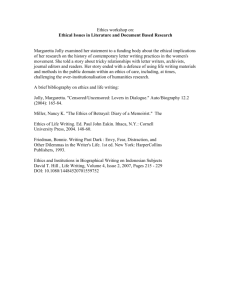HealthEthicsEducation
advertisement

Addressing cultural diversity in health ethics education Introduction This project aims to improve the relevance and applicability of health care education, specifically health ethics education. Health ethics is a compulsory requirement of medical and allied health curricula for course accreditation, and its application is particularly sensitive to cultural context. However, to date, little attention has been paid to the complexities of teaching health ethics in culturally diverse contexts or to the increasing diversity of students’ values and experiences. Consider the following scenario. An international medical student from Vietnam experiences her first clinical placement in Melbourne. In her ethics classes she was taught that it is e important to respect patients’ autonomy. On her clinical placement she finds it challenging when an Asian family requests that doctors conceal the diagnosis of a terminal illness from their elderly father. The student is aware that it might be acceptable to respect this request in a hospital in her own country. She is also aware that there are guidelines and ethical principles in Australia that require patients to be told the truth about their health status. This scenario results in a tension between the ethical principles that she has been taught, her own culturally-based values and an obligation to respect pluralism. Current health ethics curricula in Australian universities are based on western developed bioethics frameworks and are commonly underpinned by four ‘universal’ prima facie moral principles - respect for autonomy, beneficence, non-maleficence, and justice. However, there are concerns about the appropriateness of delivering a homogenous western-developed health ethics education to students who come from, or will practise in, non-western settings. Our project explicitly addresses these concerns. It addresses the debate about the appropriateness of western developed medical ethics in diverse contexts, and will contribute to the building of an evidence-based ethics teaching framework. This project is a collaboration between health ethics educators in Australian universities. We will enhance teaching and learning in health ethics by developing teaching materials that are responsive to the increasing cultural diversity of students. The outcome of the project will be the development of a practical health ethics curriculum that addresses the increasing cultural diversity of the student body and is relevant across a range of health disciplines (medicine, nursing, allied health) and teaching contexts (urban, rural, international). It is also anticipated that the outcomes of this project will be applicable to other non-health related disciplines. Rationale and aims of the project It is important that health ethics teaching is relevant and up-to-date, that it is taught in a culturally informed and meaningful way, and reflects student needs. However, there has not been national curriculum development in health ethics since the formulation of National Medical Ethics Consensus Curriculum in 2001 (Association of Teachers of Ethics and Law in Australian and New Zealand Medical Schools, 2001). Health ethics curricula have not kept pace with many recent developments, notably: increasing cultural diversity of student populations; diversity of contexts in which health ethics education is delivered ; greater numbers of international students enrolled in medicine, nursing and allied health; the internationalisation of health care practice; ever-increasing diversity in patient populations; increased focus on interdisciplinary health care practice; policies that address inequities in Indigenous education and health; Our proposal is particularly timely and relevant to the current Australian context for the following reasons. Firstly, course accreditation for health professional degrees now requires graduates to be able to work effectively in diverse cultural contexts. For example, the Australian Medical Council guidelines for the assessment and accreditation of medical schools (2006) state that medical graduates “must be able to work effectively, competently and safely in a diversity of cultural environments including a diversity of Indigenous health environments” (p1). These guidelines also state that “doctors must be aware of the impact of their own culture and cultural values on the delivery of services” (p1). Secondly the increasingly global nature of health education entails that cultural diversity is the norm, and not the exception. Finally, there is increasing emphasis on evidence based teaching. However, there is a current lack of evidence to support the curriculum content and methods of teaching of health ethics to culturally diverse students. . The aims of this project are to: 1. Document a range of approaches to health ethics teaching and the extent to which current curricula accommodate cultural diversity. 2. Identify ethical tensions that students encounter in their clinical placements . 3. Develop a philosophical approach to health ethics pedagogy that addresses culturally-based differences in values (i.e. a cross-culturally informed health ethics curricula framework). 4. Develop, evaluate and disseminate health ethics teaching materials, including case studies and scenarios, that draw from these culturally diverse clinical experiences.








